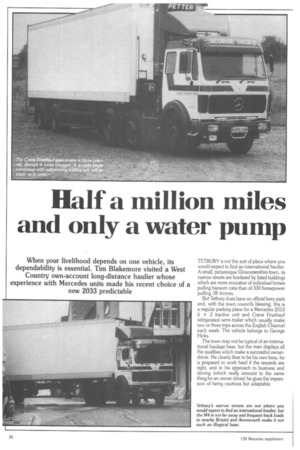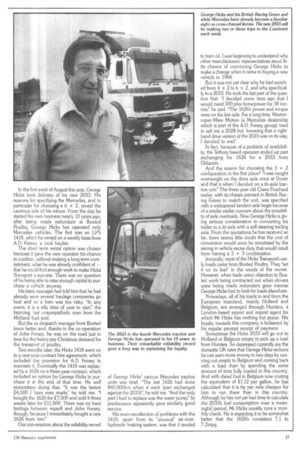Half a million miles and only a water pump
Page 152

Page 153

If you've noticed an error in this article please click here to report it so we can fix it.
TETBURY is not the sort of place where you would expect to find an international haulier. A small, picturesque Gloucestershire town, its narrow streets are bordered by listed buildings which are more evocative of individual horses pulling hansom cabs than of 330 horsepower pulling 38 tonnes.
But Tetbury does have an official lorry park and, with the town council's blessing. this is a regular parking place for a Mercedes 2033 6 x 2 tractive unit and Crane Fruehauf refrigerated semi-trailer which usually make two or three trips across the English Channel each week. The vehicle belongs to George Hicks.
The town may not be typical of an international haulage base, but the man displays all the qualities which make a successful ownerdriver. He clearly likes to be his own boss, he is prepared to work hard if the rewards are right, and in his approach to business and driving (which really amount to the same thing for an owner-driver) he gives the impression of being cautious but adaptable. In the first week of August this year, George Hicks took delivery of his new 2033. His reasons for specifying the Mercedes, and in particular for choosing a 6 x 2, reveal the cautious side of his nature. From the day he started his own business nearly 10 years ago, after being made redundant at Buxted Poultry, George Hicks has operated only Mercedes vehicles. The first was an LPS 1418, which he rented on a weekly basis from A.D. Forsey, a local haulier.
The short term rental option was chosen because it gave the new operator his chance to confirm, without making a long term commitment, what he was already confident of that he could find enough work to make Hicks Transport a success. There was no question of his being able to raise enough capital to purchase a vehicle anyway.
His bank manager had told him that he had already seen several haulage companies go bust and so a loan was too risky. "In any event, it is a silly time of year to start," the listening, but unsympathetic man from the Midland had said.
But the ex despatch manager from Buxted knew better and, thanks to the co-operation of John Forsey, he was on the road just in time for the heavy pre-Christmas demand for the transport of poultry.
Two months later, the Hicks 1418 went on to a one-year contract hire agreement, which included the provision for A.D. Forsey to maintain it. Eventually the 1418 was replaced by a 1626 on a three-year contract, which included an option for George Hicks to purchase it at the end of that time. He well remembers doing that. it was the fastest £4,000 I have ever made," he told me. "I bought the 1626 for £7,500 and sold it three weeks later for £11,500. There was no hard feelings between myself and John Forsey, though, because I immediately bought a new 1626 from him!"
Our conversation about the reliability record of George Hicks' various Mercedes tractive units was brief. "The last 1626 had done 840,000km when it went (part exchanged against the 2033)". he told me. "And the only part I had to replace was the water pump!' Its predecessor apparently gave similarly good service.
His main recollection of problems with the 1418, apart from its "unusual" air-overhydraulic braking system, was that it tended to burn oil. I was beginning to understand why other manufacturers' representatives stood little chance of convincing George Hicks to make a change when it came to buying a new vehicle in 1984.
But it was not yet clear why he had switched from 4 x 2 to 6 x 2, and why specifically to a 2033. He took the last part of the question first: "I decided some time ago that I would need 300 plus horsepower for 38 tonnes," he said. The 1626's power and torque were on the low side. For a long time, Westonsuper-Mare Motors (a Mercedes dealership which is part of the A.D. Forsey group) tried to sell me a 2028 but, knowing that a righthand drive version of the 2033 was on its way, I decided to wait".
In fact, because of a problem of availability, the Tetbury based operator ended up part exchanging his 1626 for a 2033 from Oldacres.
And the reason for choosing the 3 + 2 configuration in the first place? "I was caught overweight on the drive axle once at Dover and that is when I decided on a tri-axle tractive unit." The three-year-old Crane Fruehauf reefer, with its chassis painted in British Racing Green to match the unit, was specified with a widespread tandem axle bogie because of a similar earlier concern about the possibility of axle overloads. Now George Hicks is giving serious consideration to converting his trailer to a tri-axle with a self-steering trailing axle. From the quotations he has received so far, there seems little doubt that the cost of conversion would soon be amortised by the saving in vehicle excise duty that would result from having a 3 + 3 combination.
Ironically, most of the Hicks Transport's early loads came from Buxted Poultry. They "set it on its feet" in the words of the owner. However, when trade union objection to Buxted work being contracted out when drivers were being made redundant grew intense George Hicks had to look for loads elsewhere.
Nowadays, all of his loads to and from the European mainland, mainly Holland and Belgium, are arranged through Huntara, a London-based export and import agent for which Mr Hicks has nothing but praise. His loyalty towards this company is bolstered by his regular prompt receipt of payment.
Sometimes the Hicks 2033 will go out to Holland or Belgium empty to pick up a load from Huntara. So depressed currently are the domestic UK rates that George Hicks reckons he can earn more money in two days by running out empty to Belgium and coming back with a load than by spending the same amount of time fully loaded in this country. And with diesel fuel in Belgium now costing the equivalent of £1.12 per gallon, he has calculated that it is 6p per mile cheaper for .him to run there than in this country. Although he has not yet had time to calculate the 2033's fuel consumption over a meaningful period, Mr Hicks usually runs a monthly check. He is expecting it to be somewhat better that the 1626's consistent 7.1 to 7.2mpg.




























































































































































